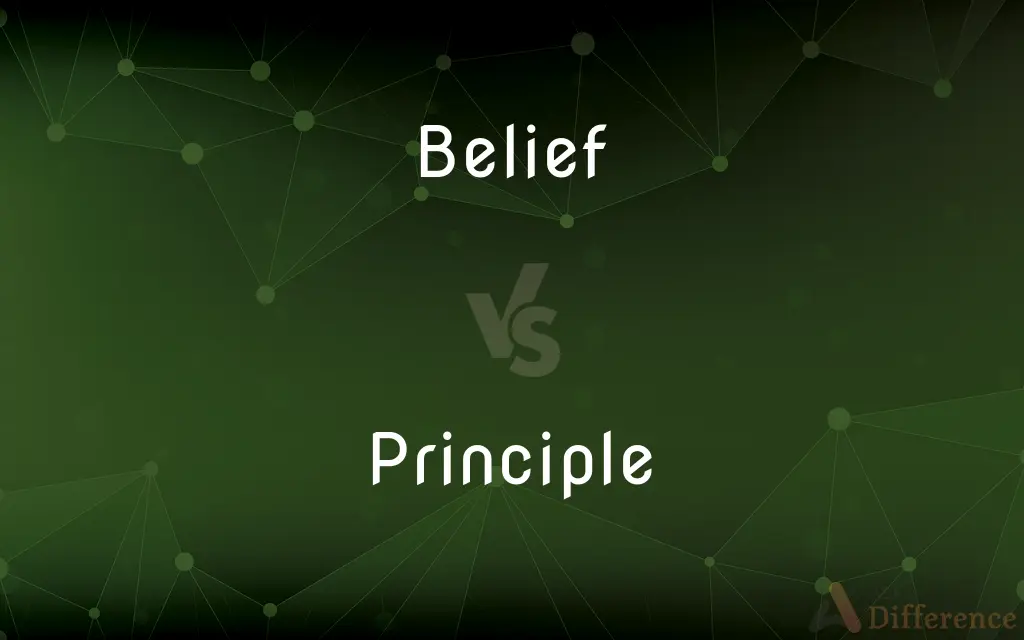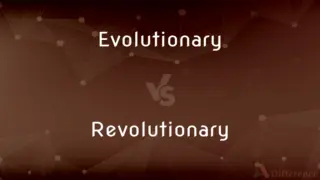Belief vs. Principle — What's the Difference?

Difference Between Belief and Principle
ADVERTISEMENT
Compare with Definitions
Belief
A belief is an attitude that something is the case, or that some proposition about the world is true. In epistemology, philosophers use the term "belief" to refer to attitudes about the world which can be either true or false.
Principle
A principle is a proposition or value that is a guide for behavior or evaluation. In law, it is a rule that has to be or usually is to be followed.
Belief
The mental act, condition, or habit of placing trust or confidence in another
My belief in you is as strong as ever.
Principle
A fundamental truth or proposition that serves as the foundation for a system of belief or behaviour or for a chain of reasoning
The basic principles of justice
Belief
Mental acceptance of and conviction in the truth, actuality, or validity of something
His explanation of what happened defies belief.
ADVERTISEMENT
Principle
A general scientific theorem or law that has numerous special applications across a wide field.
Belief
Something believed or accepted as true, especially a particular tenet or a body of tenets accepted by a group of persons.
Principle
A fundamental source or basis of something
The first principle of all things was water
Belief
Mental acceptance of a claim as true.
It's my belief that the thief is somebody known to us.
Principle
A basic truth, law, or assumption
The principles of democracy.
Belief
Faith or trust in the reality of something; often based upon one's own reasoning, trust in a claim, desire of actuality, and/or evidence considered.
My belief is that there is a bear in the woods. Bill said he saw one.
Based on this data, it is our belief that X does not occur.
Principle
A rule or standard, especially of good behavior
A man of principle.
Belief
(countable) Something believed.
The ancient people have a belief in many deities.
Principle
The collectivity of moral or ethical standards or judgments
A decision based on principle rather than expediency.
Belief
(uncountable) The quality or state of believing.
My belief that it will rain tomorrow is strong.
Principle
A fixed or predetermined policy or mode of action.
Belief
(uncountable) Religious faith.
She often said it was her belief that carried her through the hard times.
Principle
A basic or essential quality or element determining intrinsic nature or characteristic behavior
The principle of self-preservation.
Belief
(in the plural) One's religious or moral convictions.
I can't do that. It's against my beliefs.
Principle
A rule or law concerning the functioning of natural phenomena or mechanical processes
The principle of jet propulsion.
Belief
Assent to a proposition or affirmation, or the acceptance of a fact, opinion, or assertion as real or true, without immediate personal knowledge; reliance upon word or testimony; partial or full assurance without positive knowledge or absolute certainty; persuasion; conviction; confidence; as, belief of a witness; the belief of our senses.
Belief admits of all degrees, from the slightest suspicion to the fullest assurance.
Principle
(Chemistry) One of the elements that compose a substance, especially one that gives some special quality or effect.
Belief
A persuasion of the truths of religion; faith.
No man can attain [to] belief by the bare contemplation of heaven and earth.
Principle
A basic source. See Usage Note at principal.
Belief
The thing believed; the object of belief.
Superstitious prophecies are not only the belief of fools, but the talk sometimes of wise men.
Principle
A fundamental assumption or guiding belief.
We need some sort of principles to reason from.
Belief
A tenet, or the body of tenets, held by the advocates of any class of views; doctrine; creed.
In the heat of persecution to which Christian belief was subject upon its first promulgation.
Principle
A rule used to choose among solutions to a problem.
The principle of least privilege holds that a process should only receive the permissions it needs.
Belief
Any cognitive content held as true
Principle
Moral rule or aspect.
I don't doubt your principles.
You are clearly a person of principle.
It's the principle of the thing; I won't do business with someone I can't trust.
Belief
A vague idea in which some confidence is placed;
His impression of her was favorable
What are your feelings about the crisis?
It strengthened my belief in his sincerity
I had a feeling that she was lying
Principle
(physics) A rule or law of nature, or the basic idea on how the laws of nature are applied.
Bernoulli's Principle
The Pauli Exclusion Principle prevents two fermions from occupying the same state.
The principle of the internal combustion engine
Principle
A fundamental essence, particularly one producing a given quality.
Many believe that life is the result of some vital principle.
Principle
A source, or origin; that from which anything proceeds; fundamental substance or energy; primordial substance; ultimate element, or cause.
Principle
An original faculty or endowment.
Principle
Misspelling of principal
Principle
(obsolete) A beginning.
Principle
(transitive) To equip with principles; to establish, or fix, in certain principles; to impress with any tenet or rule of conduct.
Principle
Beginning; commencement.
Doubting sad end of principle unsound.
Principle
A source, or origin; that from which anything proceeds; fundamental substance or energy; primordial substance; ultimate element, or cause.
The soul of man is an active principle.
Principle
An original faculty or endowment.
Nature in your principles hath set [benignity].
Those active principles whose direct and ultimate object is the communication either of enjoyment or suffering.
Principle
A fundamental truth; a comprehensive law or doctrine, from which others are derived, or on which others are founded; a general truth; an elementary proposition; a maxim; an axiom; a postulate.
Therefore, leaving the principles of the doctrine of Christ, let us go on unto perfection.
A good principle, not rightly understood, may prove as hurtful as a bad.
Principle
A settled rule of action; a governing law of conduct; an opinion or belief which exercises a directing influence on the life and behavior; a rule (usually, a right rule) of conduct consistently directing one's actions; as, a person of no principle.
All kinds of dishonesty destroy our pretenses to an honest principle of mind.
Principle
Any original inherent constituent which characterizes a substance, or gives it its essential properties, and which can usually be separated by analysis; - applied especially to drugs, plant extracts, etc.
Cathartine is the bitter, purgative principle of senna.
Principle
To equip with principles; to establish, or fix, in certain principles; to impress with any tenet, or rule of conduct, good or ill.
Governors should be well principled.
Let an enthusiast be principled that he or his teacher is inspired.
Principle
A basic generalization that is accepted as true and that can be used as a basis for reasoning or conduct;
Their principles of composition characterized all their works
Principle
A rule or standard especially of good behavior;
A man of principle
He will not violate his principles
Principle
A basic truth or law or assumption;
The principles of democracy
Principle
A rule or law concerning a natural phenomenon or the function of a complex system;
The principle of the conservation of mass
The principle of jet propulsion
The right-hand rule for inductive fields
Principle
Rule of personal conduct
Principle
(law) an explanation of the fundamental reasons (especially an explanation of the working of some device in terms of laws of nature);
The rationale for capital punishment
The principles of internal-combustion engines
Share Your Discovery

Previous Comparison
Evolutionary vs. Revolutionary
Next Comparison
Finch vs. Goldfinch













































